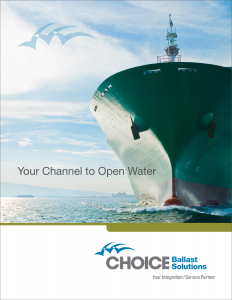by Debra DiCianna, Senior Compliance Engineer
Recently, the U.S. Coast Guard Office of Commercial Vessels Safety published CG-CVC Policy Letter 18-02. This Policy Letter provides guidelines for inoperable ballast water management systems (BWMS) bound for U.S. ports. This is welcomed information from the USCG; however, it does not cover some of the long-term problems experienced by shipowners.
While many BWMS manufacturers have responded quickly in making repairs and solving problems, some are more challenging to reach when the equipment breaks down. Choice has been working with shipowners to provide onboard assessment of BWMS equipment, installation arrangement and components and to identify root causes of issues. I have communicated shipowners’ concerns to the USCG over the difficulty in resolving problems when faced with an inoperable system, but unfortunately the new guidelines released do not address these concerns. Choice will continue to discuss this with the USCG and look for further options for the shipowner regarding these complicated service issues. Please feel free to contact me directly at ddicianna@choiceballast.com or you may call the Choice office at +1 440.973.9841 or email info@choiceballast.com if you have any issues with BWMS inoperability.
About Debra DiCianna
Debra DiCianna has extensive experience in the compliance and operational issues of shipowners and the design/performance of ballast water management systems. Debra is a delegate for the US at the International Maritime Organization (IMO) and serves on the U.S. Environmental Protection Agency Environmental Technology Verification (ETV) Ballast Water Tech Panel.
Prior to joining Choice Ballast Solutions, Debra supported the U.S. Environmental Protection Agency on development of the 2013 Vessel General Permit and research for future updates. She also consulted for the U.S. Navy, U.S. Coast Guard, the U.S. Military Sealift Command and the American Bureau of Shipping in developing waste management solutions, assessing environmental compliance issues, and designing ship environmental systems. During her tenure with the U.S. Environmental Protection Agency, Debra studied the design and performance of treatment technologies and developed water discharge regulations.
Debra has Master of Science and Bachelor of Science degrees in Chemical Engineering from the University of Pittsburgh.


